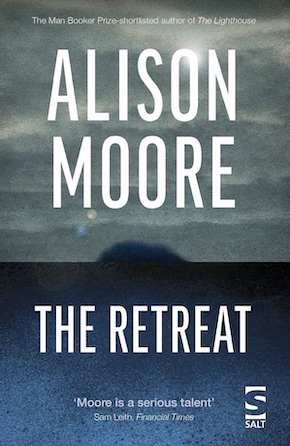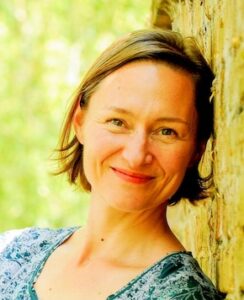Imagining an island
by Alison Moore
“Like the islands, the novel is foggy and mysterious, and the reader is constantly wrongfooted.” Guardian
While fine-tuning my fourth novel, Missing, I started thinking about my fifth. In the Scottish Borders, fact-checking my references to Hawick, I mentioned to the friend with whom we were staying that I was thinking of setting my next novel somewhere totally fictional, somewhere superficially familiar but with local customs and minor rules that would leave my protagonist, a visitor to this place, feeling constantly slightly off-kilter.
When I thought in more detail about how this story might work, I found myself favouring – rather than an incomer to an existing community – a gathering of people on an island. I wrote in my notes: a writing retreat? (I also wondered if the island might be inhabited by a reclusive writer, and toyed with the idea of that writer being Shirley Longford, a pseudonym I’d recently used for a horror novelette.)
Over the years, I’ve taken part in a number of writing retreats and they’ve been unfailingly positive environments. In my twenties, I signed up for a short story retreat in Haltwhistle, Northumberland, and spent a memorable and valuable weekend trying things out within a convivial and encouraging group, and being well looked after by our hosts. Many years later, I was attending writing retreats as a visiting author, my first being a Retreat West ‘Walk and Write’ group at the stunning Lighthouse Keepers’ Cottage in Devon, and my most recent being at Moniack Mhor, the well-loved creative writing centre in the Scottish Highlands. Every retreat in which I’ve participated has been as welcoming and companiable as my protagonist is hoping for in my novel.
I settled on an artists’ retreat, whose group of six does include a writer – a poet – but most of whom are visual and conceptual artists. My protagonist, Sandra, is focusing on watercolour landscapes and seascapes: Once upon a time, she had wanted to go to art college, to become an artist. She had won certificates for her art at school, and, in her final year, a prize for the greatest effort. I remember certificates being given out at school: most were for academic achievement and mine was for nice handwriting. In my twenties, I accompanied a friend of mine (the same friend mentioned above) to weekly life-drawing classes, and although I loved it – partly for the journey there, walking up Leicester’s beautiful New Walk in the dark – my pictures were consistently disappointing. Sandra is aware of the ‘rule’ that it takes ten thousand hours of practice to become an expert, and she wonders if it is true: what if it just did not happen; what if, after ten thousand hours, what she’d been working towards still eluded her? She would be an old lady with thousands of disappointing seas.
I remember certificates being given out at school: most were for academic achievement and mine was for nice handwriting.”
Sandra sets off to spend a fortnight with this group on a previously private island. She fantasises about living among artists, in a little community. She imagines them supporting and inspiring one another. I half had in mind D.H. Lawrence’s lifelong desire to form a “little colony” of artist friends. In 1915, Lawrence wrote to a friend, “I want to gather together about twenty souls and sail away from this world.” In D.H. Lawrence: The Life of an Outsider, John Worthen writes that “Lawrence intensely enjoyed… the hopefulness, the idea” of a colony. At the same time, Lawrence believed himself to be an outsider, and wrote in a 1920 letter, “I don’t like people – truly I don’t.”
In creating my fictional island – a series of islands in fact – I drew on a trip to the Channel Islands, which I’d wanted to visit for this purpose and which we arranged as a family holiday in 2018. We explored Guernsey, Herm and Sark, including Little Sark. I made notes, mostly about the landscape: brambles, ivy, mushrooms, gorse, as well as aloe vera and bamboo, and – unexpected in the English Channel in October – palm trees (“Tropical,” said my son). One of my islands has Guernsey’s blue post boxes and yellow telephone boxes but a different currency; it is not quite like Sandra’s known world, and it is not quite Guernsey either. The poet, arriving on Lieloh and discovering she is no longer in Britain, looks perturbed, as if, without her passport or inoculations, she has stepped into another world by mistake. She checks that they are still in the same time zone, and seems to take some comfort from that. There were other, more subjective details too, which found their way into my story: Can hear birds but can’t see them. It was a fruitful research trip and a fantastic holiday, and we planned a follow-up to Jersey in 2020, though that had to be cancelled because in the meantime the pandemic arrived.
By chance, I’d completed my first drafts of The Retreat a few weeks before homeschooling started, getting it to the point at which I could send it out to my agent and editor. I also sent it to two willing friends: a visual artist whose watercolour landscapes are precisely what Sandra aspires to paint, and the friend with whom I went life-drawing many moons ago. Both were extremely generous with the time and consideration they gave to my work in progress, providing valuable and encouraging feedback. If I were to form a little colony of artists, to gather together twenty souls and sail away, I would definitely want to include these two friends, to whom The Retreat is dedicated.
 Alison Moore’s short fiction has been included in Best British Short Stories, Best British Horror and Best New Horror anthologies, broadcast on BBC Radio and collected in The Pre-War House and Other Stories. Her first novel, The Lighthouse, was shortlisted for the Man Booker Prize and the National Book Awards, winning the McKitterick Prize. Both The Lighthouse and her second novel, He Wants, were Observer Books of the Year. Recent publications include a series for children, beginning with Sunny and the Ghosts. Born in Manchester in 1971, she lives in a village on the Leicestershire-Nottinghamshire border with her husband and son and is an honorary lecturer in the School of English at the University of Nottingham. The Retreat is published by Salt in paperback at £9.99.
Alison Moore’s short fiction has been included in Best British Short Stories, Best British Horror and Best New Horror anthologies, broadcast on BBC Radio and collected in The Pre-War House and Other Stories. Her first novel, The Lighthouse, was shortlisted for the Man Booker Prize and the National Book Awards, winning the McKitterick Prize. Both The Lighthouse and her second novel, He Wants, were Observer Books of the Year. Recent publications include a series for children, beginning with Sunny and the Ghosts. Born in Manchester in 1971, she lives in a village on the Leicestershire-Nottinghamshire border with her husband and son and is an honorary lecturer in the School of English at the University of Nottingham. The Retreat is published by Salt in paperback at £9.99.
Read more
alison-moore.com
@alimooreauthor
Author portrait © Beth Walsh Photography

